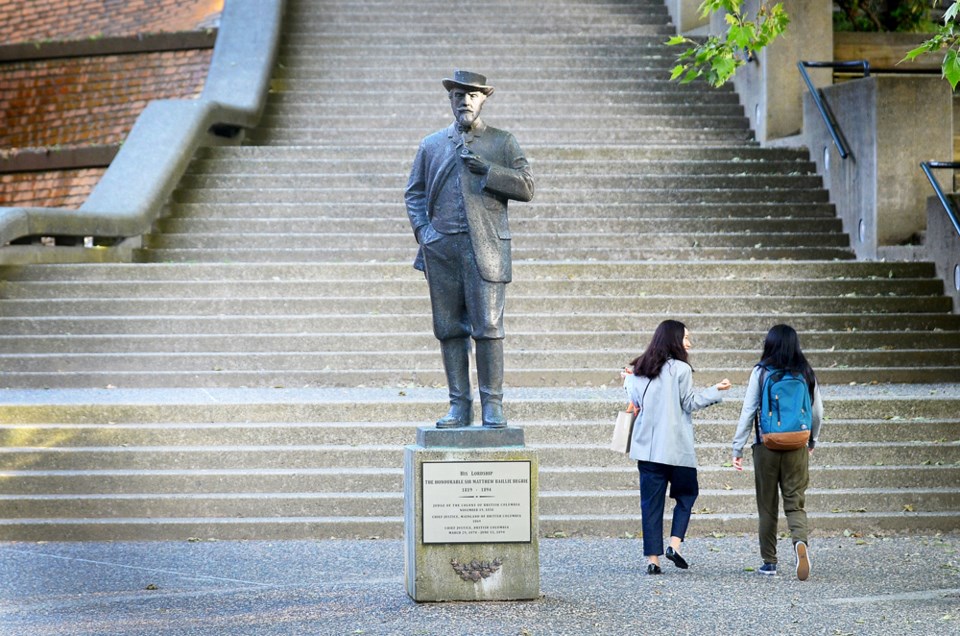Details still have to be worked out on when the Judge Begbie statue will be removed from Begbie Square and where it will go.
On May 6, city council voted 4-2 in favour of removing the Judge Begbie statue from in front of the provincial courthouse on Carnarvon Street.
“We will wait for information from staff about the process of removal,” Coun. Nadine Nakagawa said in an email to the Record. “I don’t know the logistics associated with moving and storing a statue.”
As per the motion approved by council, the city will also: engage in a conversation with the Tŝilhqot’in Nation about the history and legacy of Judge Begbie and the effects his decisions had on generations of their people; work with the city’s museum and archives, the community and the Tŝilhqot’in Nation to find an appropriate place for the statue; and engage in a process of consultation to find an appropriate place to tell the history of the Chilcotin War.
Nakagawa, who put forward the motion, said the city needs to respond to a request by the Tŝilhqot’in chiefs in 2017 to remove all namesakes of Judge Matthew Baillie Begbie, who was the first chief justice of the Colony of British Columbia.
In 1864, Begbie presided over a murder trial in Quesnel of five Tŝilhqot’in chiefs who were found guilty and sentenced to hang. The following year, a sixth chief, Chief Ahan, was tried, convicted and sentenced to death in New Westminster – in a spot not far from where the statue stands.
In 2014, the provincial government apologized to the Tŝilhqot’in Nation for the wrongful execution of the six chiefs. In 2018, the federal government fully exonerated the chiefs of any wrongdoing.
The Tŝilhqot’in National Government has commended city council’s decision to remove the statue from in front of the courthouse, saying it represents a legacy of pain and tragedy that’s still felt to this day.
“From the Tŝilhqot’in perspective, Judge Begbie represents a legacy of betrayal, pain and tragedy for our people,”Chief Joe Alphonse, tribal chair of the Tŝilhqot’in National Government said in a press release. “Removing Judge Begbie’s statue from public spaces does not remove him from history, but rather recognizes our history and our experience as Indigenous peoples. We are grateful for the leadership shown by the New Westminster city council and for the understanding and compassion for our people that this decision reflects.”
A statement from the Tŝilhqot’in National Government states that removing the statue allows for healing and reconciliation to take place for Tŝilhqot’in communities and reflects an era of cultural understanding and appreciation for the Tŝilhqot’in and all Indigenous peoples.
Blair Fryer, the city’s manager of communications and economic development, said staff are awaiting further direction from council on when the statue should be removed from Begbie Square and where it will go until a new home is found.
While council has approved a motion to remove the statue from its current home on Carnarvon Street, no motion has been considered regarding renaming of Begbie Square or Begbie Street.
“For renaming streets and public spaces, there are a number of place names in New West that are named after what are now controversial figures and it is worth considering them together,” Nakagawa said.



